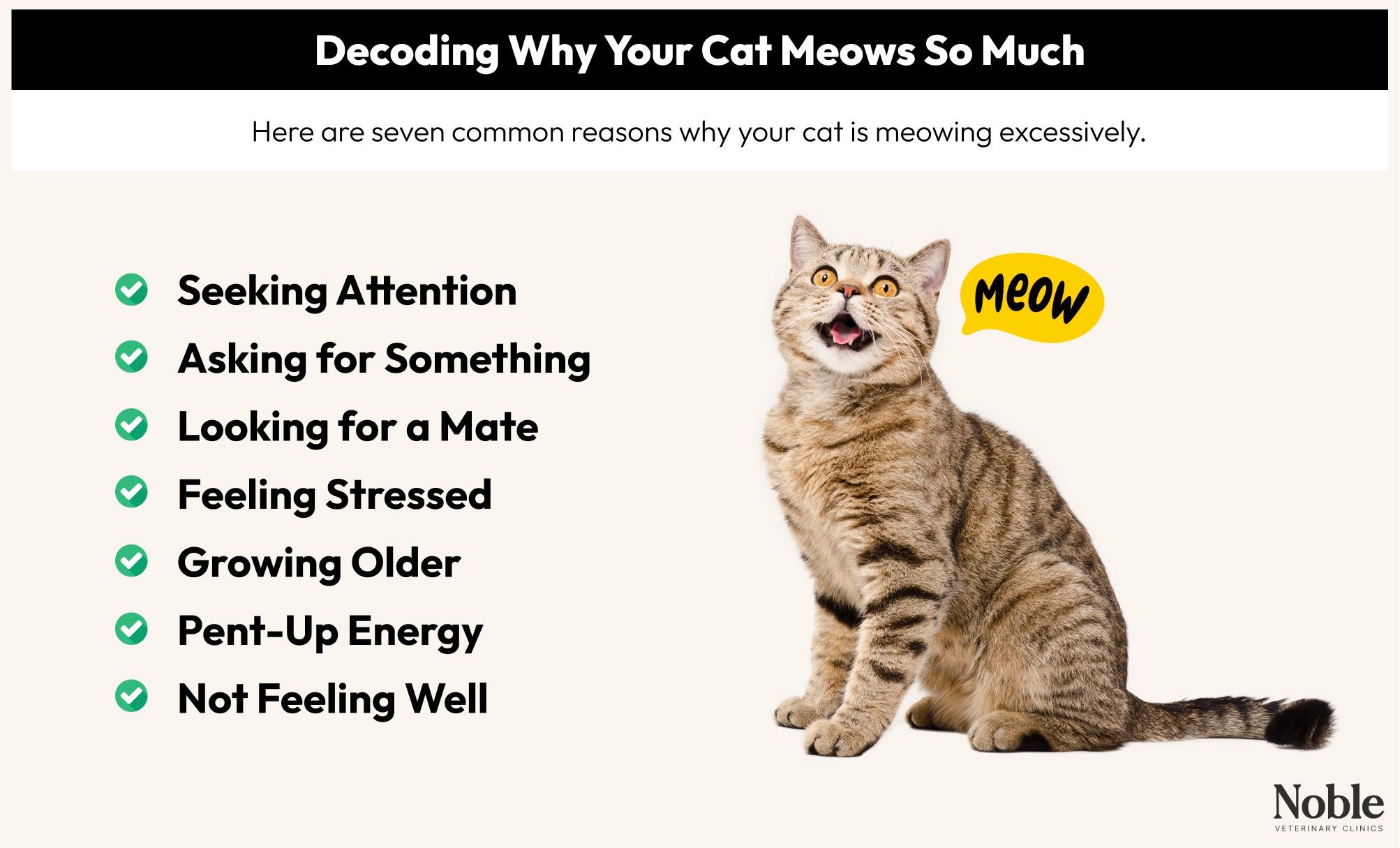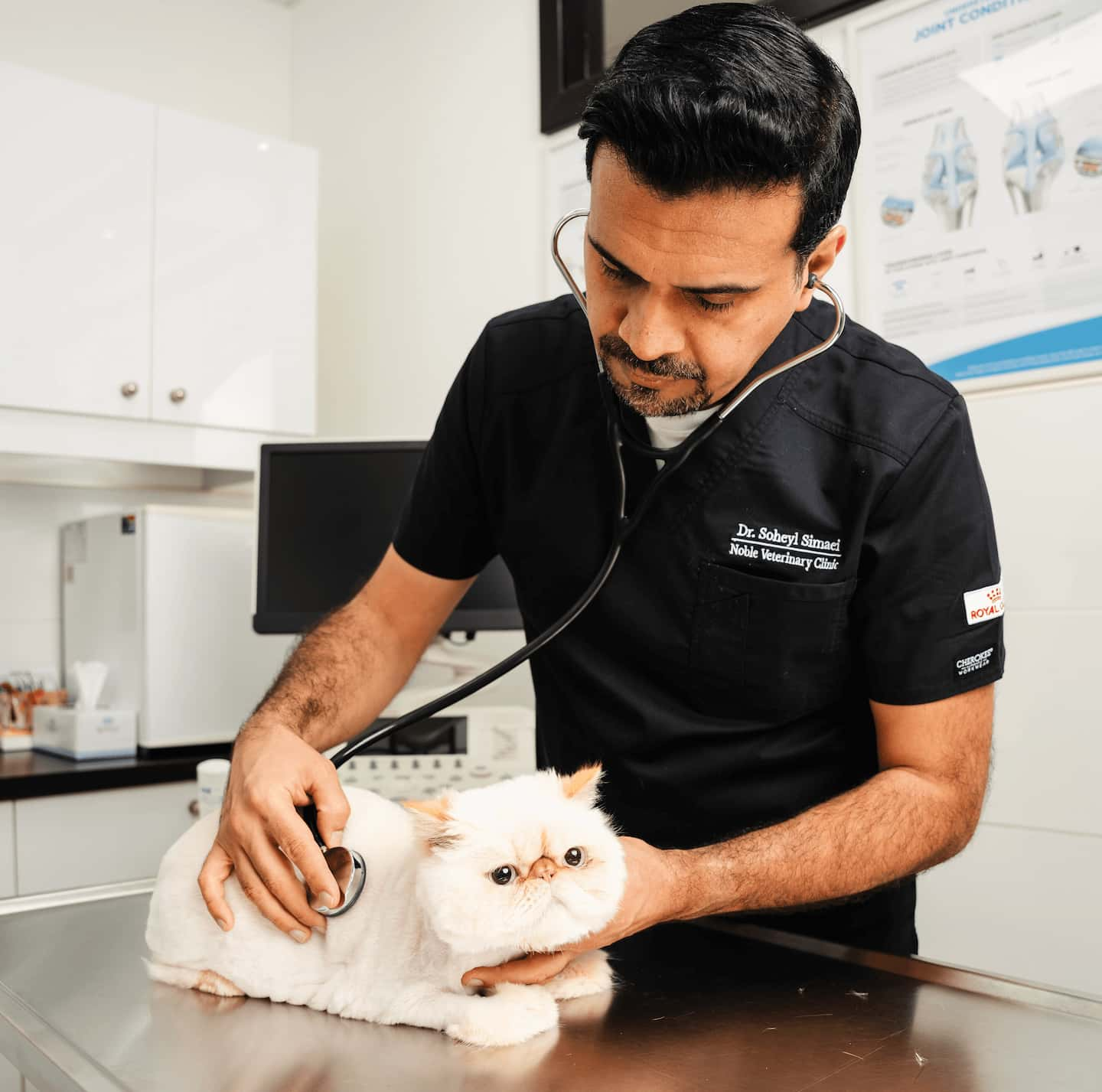


Is your cat meowing so much, especially at night? The truth is, you’re not the only cat owner who’s experiencing this.
Cats are known for being vocal creatures. They often meow, yowl, and purr to communicate with us. But when their meowing becomes excessive, it could mean that there’s something wrong.
Understanding the reason behind your cat’s behavior is the first step in resolving it. Let’s explore some common reasons why your cat might be meowing excessively and what you can do to help.
What Is Excessive Meowing?
Every cat is different, and some are naturally more vocal than others. But a cat that meows almost all the time and disrupts your daily life or becomes a source of stress is something to be concerned about.
Your cat may start waking you up in the middle of the night, or won’t stop meowing at your feet during work calls. If you’ve noticed this new behavior in your cat, it’s time to know the reason behind it.
Why Is My Cat Meowing So Much?

Cats may have various reasons for meowing too much. It could be that you have a needy pet, or it may be a serious health issue. Here are common reasons why a cat may meow excessively.
Seeking Attention
Most people believe that cats are quite reserved and that they like being independent. But cat owners know that this isn’t always true. Many cats crave attention and affection.
Boredom, loneliness, or simply wanting some time with you are some reasons why your cat is meowing nonstop. Your feline companion might want some playtime, petting, or your company.
What Should I Do?
It’s important to understand that you must not reward the meowing. If your cat learns that meowing gets immediate attention, they’ll keep doing it. Instead, reward quiet behavior with play and interaction. Ignore the meowing and engage with them only when they are silent. Cats are smart—they’ll immediately know what action they take to get what they want.
Asking for Something
Since cats can’t talk, they use their vocalization to tell you that they want something. This is one of the most straightforward reasons behind this behavior. It could be that your pet is hungry, thirsty, or wants a treat.
What Should I Do?
Check their food and water bowls. If they’re empty, that could be the problem. One of the best ways to prevent this from happening is by sticking to a feeding schedule. Having a routine will let your cat understand that they just need to wait for a certain time of the day to get their food.
Observe other clues if the reason is not the food or water. Check whether your cat is meowing near the door. This may mean that it wants to be let out of the room. They can be meowing near the TV or beside the remote, which could mean they want you to change the TV channel.
Looking for a Mate
This is a common reason, especially if you have an unspayed cat. When female cats are in heat, they can become extremely vocal. They’ll meow and yowl to attract a mate. Male cats will also be loud if they sense a female in heat nearby.
What Should I Do?
If this is the cause of the issue, the best solution is to get your cat neutered (spay for female cats and castration for male cats). This procedure may entirely eliminate excessive meowing in your cat. Also, neutering comes with a lot of health benefits, which is why many cat owners consider the surgery while their pets are still young.
Feeling Stressed
Cats are habitual by nature, so a little change in their daily routine can make them anxious. Changes in your cat’s environment or routine can lead to stress, which can trigger more meowing.
Think about what could be stressing your cat. Could it be a new pet? Perhaps you’re spending longer hours outdoors than usual while your companion waits for you at home.
What Should I Do?
If this sounds like your situation, you should provide your cat with stability.
Stick to a regular feeding and playtime schedule
Set up a dedicated space where your cat can relax when stressed
Make time to comfort your cat by scratching or petting
Use calming aids like a pheromone diffuser
Through these simple actions and preparations, you can help calm your cat and lessen the excessive meowing.
Growing Older
As cats get older, they may experience some changes that cause them to vocalize more. Senior cats might suffer from conditions like vision or hearing loss, which can make them disoriented or confused.
What Should I Do?
It’s not uncommon for senior cats to be excessively meowing at night. To help them feel more comfortable and safe, you can install night lights. It’s also important to make their surroundings less stressful to reduce their nighttime vocalizations.
Filled with Pent-Up Energy
If a young cat meows excessively at night, it could be that they have extra energy they didn’t burn off during the day.
"Zoomies, or Frenetic Random Activity Periods (FRAPs), are a normal behavior in cats. They exhibit this behavior to release built-up energy resulting from long naps during the day or environmental stimulations. If your cat frequently experiences nighttime zoomies, they may require more daytime activities."
– Dr. Leticia Maia
It’s natural for cats to be more active during dawn and dusk if they don’t get enough playtime. They may start meowing, running around, or waking you up in the middle of the night.
What Should I Do?
To solve this issue, you can have pre-bedtime play sessions, provide enough interactive toys all the time, or set up an automatic feeder for when they get hungry at night. It also helps to have a consistent routine for feeding, play, and sleep times to regulate your cat’s activity levels.
Not Feeling Well
If your cat has suddenly started meowing excessively, this could be a medical issue. There are various health conditions that can cause a cat to vocalize more. These problems include kidney disease, hyperthyroidism, or an injury.
What Should I Do?
When you have already tried everything you can to address your cat’s needs and the meowing still persists, it might be time to visit a vet.
Schedule a pet clinic visit or home vet visit. Your veterinarian can determine the cause of your cat’s excessive meowing with a thorough examination. The vet may use various diagnostic methods to detect the underlying health issue and treat it as needed.
When Meowing Signals an Emergency

When your cat’s excessive mooring is accompanied by other distressing symptoms, you may need to act quickly. Here are some signs that your cat needs emergency care:
Yowling loudly in pain and staying still
Struggling to breathe rapidly with an open mouth
Persistent meowing with vomiting or diarrhea
Bloated or swollen belly with loud meowing
Pacing, bumping into things, or meowing as if lost
Crying out in the litter box while trying to urinate or defecate
If your cat’s excessive meowing is caused by any of these symptoms, contact the emergency vet clinic immediately. An experienced veterinary team will quickly diagnose and treat your cat to ease their discomfort as soon as possible.
Conclusion
Excessive meowing can be frustrating, especially when it happens in the middle of the night. Remember that cats are simply trying to communicate with us.
Whether your cat wants attention, is feeling hungry, or is dealing with stress or age-related changes, understanding their needs can help solve the problem. You should also remember that your pet might be meowing because it’s in pain.
If you’re unsure of what to do, you can always schedule a vet consultation. Your vet can help you decrypt the reason for the excessive meowing and guide you on the best solutions to finally put a stop to this behavior.
Share











